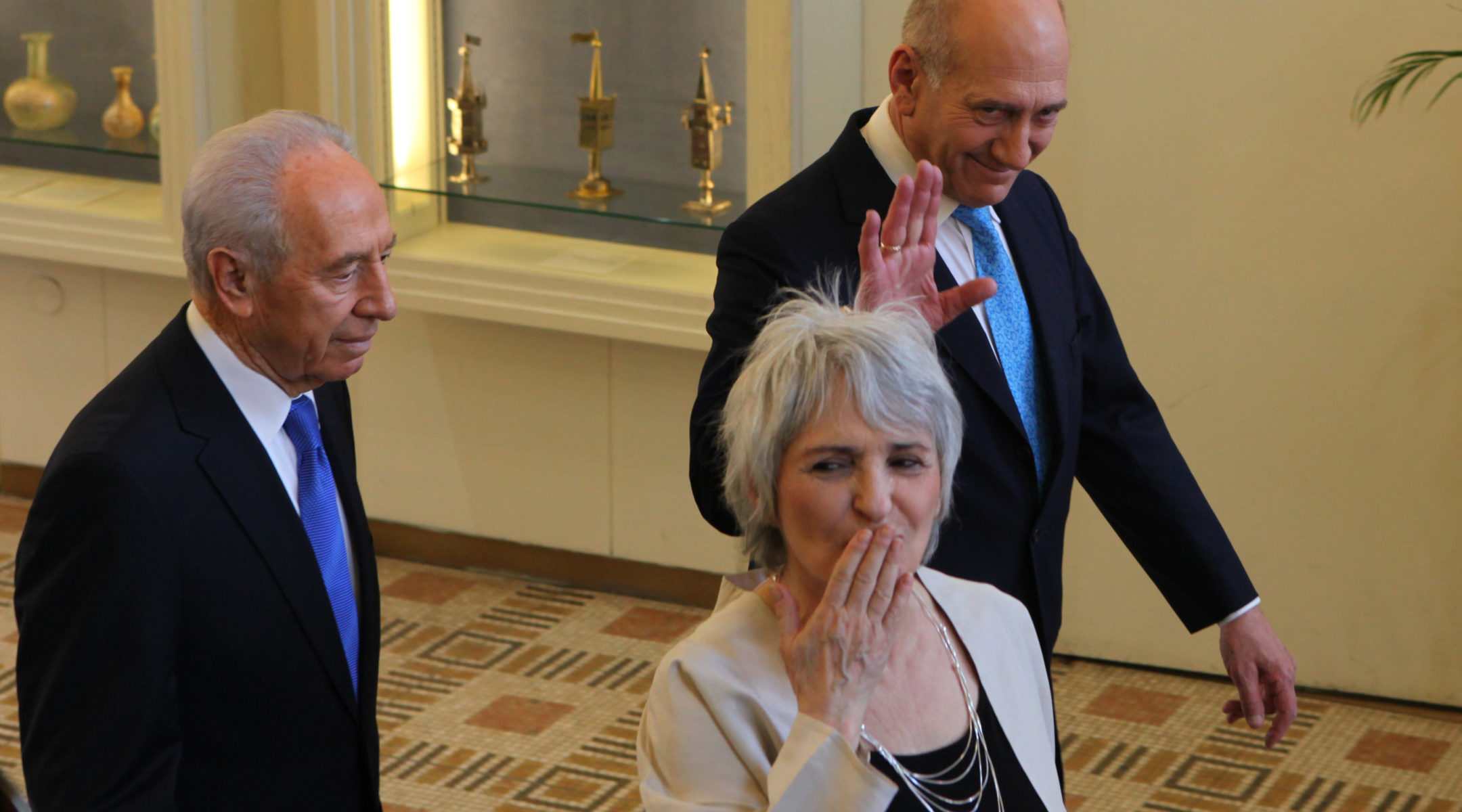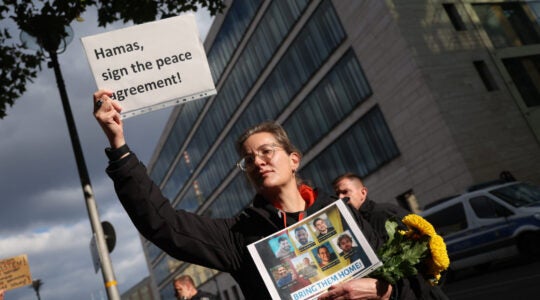NEWS ANALYSIS
NEW YORK (JTA) — When a handful of rabbis, mayors and public officials were among the 44 people arrested last month in New Jersey, capping a multiyear FBI corruption probe, the suspects were hauled off to jail and indicted on the same day the public learned of the investigation.
But in Israel, where public officials from Foreign Minister Avigdor Lieberman to former Prime Minister Ehud Olmert are the subjects of multiple corruption probes, years often pass from the moment the public first learns of an investigation to the moment the suspects are charged with a crime — if they’re ever indicted at all.
In the interim, reputations are sullied, the media cry for blood and careers are ruined. In Olmert’s case, news of the investigations forced the resignation of a prime minister. More than a year since Olmert announced he was stepping down, he still has not been indicted with a crime.
Two of the five investigations against him have since been dropped — one alleging that Olmert changed the terms of a contract to purchase shares of Bank Leumi in order to help a friend, the other that Olmert purchased on apartment on Jerusalem’s Cremieux Street at a discount in exchange for favors.
None of this is to say that the former prime minister is innocent, though he claims to be. Olmert still faces three investigations — that he double-billed for overseas trips, made improper appointments when he was minister of trade and labor, and accepted cash from American Jewish businessman Morris Talansky — and Israel’s attorney general said this week that decisions on indicting Olmert in those affairs are forthcoming.
But without an indictment in hand or a trial in court, Olmert has not had the opportunity to fully address the charges against him and defend himself. Earlier this month, Olmert’s lawyers waived his right to a hearing on the indictments because they said Olmert would not get a fair shot — a charge Attorney General Menachem Mazuz dismissed. Olmert’s attorneys said they are waiting for the indictments.
“We have no doubt that when it gets to court we will have a real opportunity to mount a defense, which we haven’t had until now,” Olmert spokesman Amir Dan told JTA. “Unlike the complaints that led to the resignation of the prime minister, the court can look at things objectively. And Olmert intends to defend his innocence.”
While courts presume innocence until guilt is proven, the public rarely does. That puts public figures at a particular disadvantage when it comes to long-running corruption investigations conducted in the public eye under the shadow of innuendo and rumors.
In Israel, there’s plenty of blame to go around for this too-common problem. Police and lawyers leak details of investigations to reporters. The media stoke the public’s outrage in the absence of a full public accounting. Prosecutors fail to conclude investigations quickly.
The upshot is that the right to due process is at risk in Israel.
Some argue that Olmert and Lieberman deserve the suspicion they’ve drawn. Where there’s smoke, there’s fire, these critics say.
But almost anyone can fall under suspicion — particularly those with political enemies. Yesterday it was a left-winger. Today it’s a right-winger. Tomorrow — who knows?
“What’s wrong with Israel is that people have gone vindictive, reporters are not doing their job and police leak facts from the investigation almost from the moment the investigation starts,” said Yoram Shachar, an expert in criminal law at the Herzliya Interdisciplinary Center. “They are confusing the people with a daily serving of vindictive, nasty and, in many cases, baseless information about the evil that lurks out there in government. This may lead to disaster.”
While the Israeli criminal legal system is quite similar to the American one, in practice investigations are carried out much differently.
In both countries, police conduct investigations to help prosecutors decide whether or not to issue indictments. In both countries, the legal system allows for suspects to argue for dismissing indictments before they are filed — in the United States either a judge or grand jury determines if enough evidence exists to merit a trial, and in Israel suspects have the right to a hearing.
The difference is that in the United States, much of what transpires during the preliminary stages happens behind closed doors.
In the case of former Illinois Gov. Rod Blagojevich, for example, prosecutors went public last December only when they had enough evidence to warrant an arrest. In the case of former New York Gov. Eliot Spitzer, The New York Times learned of his involvement with a prostitution ring only after four people were charged with running the scheme and the complaint detailing the charges was unsealed at a federal court in Manhattan. Spitzer acknowledged wrongdoing hours after the Times exposed his role.
In Israel, discretion is the exception.
Sometimes it can’t be helped. When police raid a suspect’s home or office, it ends up in the news. Occasionally a newspaper story sparks a police investigation.
More often, however, damaging media reports are triggered by police leaks that begin almost as soon as a corruption investigation gets under way and continue throughout the probe. Media outlets rush to report the details, but the information is incomplete, frequently inaccurate and rarely sourced.
Why is the problem so acute in Israel?
Compared with the United States, where police investigators generally stay mum except for official statements, Israel is a much smaller and more intimate society, and rampant leaking is commonplace. Media outlets in Israel also do less rigorous fact-checking than their U.S. counterparts — if they fact-check at all — and unsourced reports are published regularly with nary a challenge.
In the Israeli system, police upon concluding an investigation — it can take years — hand over their report to the state prosecutor’s office, which then conducts its own review.
The police report does not constitute a legal recommendation; it’s investigatory material. But that hasn’t stopped the Israeli media from mischaracterizing it as a recommendation and publicizing speculation about its confidential content as fact.
In the Lieberman case, when police submitted their report to the prosecutor early this month, police released a brief statement listing the allegations against the foreign minister. They included bribery, fraud, money laundering, witness harassment and obstruction of justice. Media outlets quickly filled in the blanks with what police spokesman Alex Kagalsky dismissed as “speculation.”
But that didn’t stop the Israeli daily Ha’aretz from rushing out an editorial calling on Lieberman to resign. The editorial was headlined “No reason to wait.”
After prosecutors review the police case file, if they elect to indict — a process that can take months or years, and sometimes involves returning to the police for more investigation — the indictment must be approved by the attorney general and the defendant granted a hearing before the indictment can be issued.
For both Lieberman and Olmert, that process has yet to be concluded.
In Olmert’s case, an indictment is virtually inevitable: Mazuz has hinted as much, and the notion of a prime minister being brought down by an investigation that fizzles without an indictment would be catastrophic for the image of Israeli law enforcement.
In Lieberman’s case, investigations have been ongoing for 13 years. After he became foreign minister, Lieberman petitioned Israel’s Supreme Court to speed up the probes.
All the while, the steady stream of half-truths, maybe-truths and untruths continues.
JTA has documented Jewish history in real-time for over a century. Keep our journalism strong by joining us in supporting independent, award-winning reporting.






